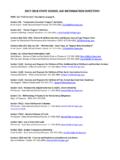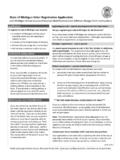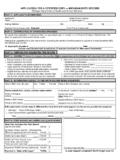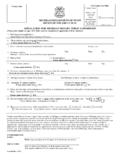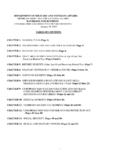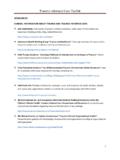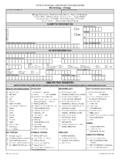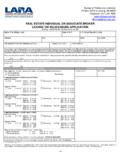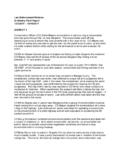Transcription of Spring 2019 Supports and Accommodations Guidance …
1 Michigan Accommodations Guidance Document | 1M-STEP, MI-ACCESS, and WIDA Supports and AccommodationsGuidance DocumentRevised November 2017 IntroductionThis Guidance document presents appropriate Supports , identification processes, classroom considerations, and guidelines for allowable Accommodations on all state assessments. Please note that more detailed information pertaining to M-STEP, MI-Access, PSAT, SAT, and ACT WorkKeys can be found in the Supports and Accommodations Table located on under the Supports and Accomomodations section of each assessment web page. The Guidance in this document pertains to all students, including English learners (ELs), Students with Disabilities (SWDs), as well as those students who are considered English learners (ELs) and are also identified as a student with a disability.
2 This document is intended for use by anyone with an interest in Supports and Accommodations for the state level summative assessments in Michigan, including, but not limited to: School Administrators Assessment Coordinators Assessment Administrators Special Education Supervisors/Directors Individualized Education Program Teams, including school personnel and parents General Education Teachers Title III/Language Acquisition Directors EL Educators Table of ContentsLegislation ..2 Michigan s Conceptual Model for Assessment Supports ..2 Selecting Appropriate Tools, Supports , and Accommodations ..3 Preparing for the Assessments ..4 universal Tools ..5 Designated Supports .
3 8 Accommodations ..13 Appendix A ..16 Michigan Accommodations Guidance Document | 2 LegislationThe Every Student Succeeds Act (ESSA) 2015 and additional legislation and Guidance from the Department of Education requires that all ELs and SWDs take assessments that measure their English language acquisition and/or their content knowledge in the core subject areas of mathematics, English language arts (ELA), science, and social studies. This legislation not only includes these testing requirements, but also aims to ensure equal access to these assessments, by requiring states to offer appropriate Supports and Accommodations that do not violate the constructs of the assessments for the inclusion of the widest range of students possible.
4 Title III Title III of the Every Student Succeeds Act (ESSA) 2015 mandates that all ELs receive quality instruction for learning both English and grade-level academic content ( Department of Education, 2002). According to ESSA, ELs are required to participate in statewide assessments that measure students English language and academic progress. Educators must ensure that students work toward grade-level content standards by using a range of instructional strategies based on the varied strengths and needs of the students. For ELs, Supports and Accommodations are provided during instruction and on assessments to guarantee equal access to grade-level content. IDEA DescriptionThe Individuals with Disabilities Education Act (IDEA) is a federal law enacted in 1990 and reauthorized in 1997 and 2004.
5 It is designed to protect the rights of SWDs by ensuring that everyone receives a free appropriate public education (FAPE), regardless of ability. Furthermore, IDEA strives not only to grant equal access to SWDs, but also to provide additional special education services and procedural safeguards for them. Special education services are individualized to meet the unique needs of SWDs and are provided in the least restrictive environment. Special education may include individual or small group instruction, curriculum or teaching modifications, assistive technology, and transition services; other specialized services include physical, occupational, and speech therapy.
6 These services are provided in accordance with an Individualized Education Program (IEP), specifically tailored to the unique needs of each s Conceptual Model for Assessment SupportsMichigan meets these legislative requirements by offering a wide array of Supports and Accommodations for students across all of its assessments. The conceptual model for understanding Michigan s assessment Supports and Accommodations is now broken down into three levels: universal Tools Available for all students Designated Supports Available when indicated by an adult or team Accommodations Available need requires documentation by an IEP or section 504 planThis model portrays the additive and sequentially inclusive nature of these three aspects.
7 universal Tools are available to all students, including those receiving Designated Supports and those receiving Accommodations . Designated Supports are available only to students who an adult or team has indicated has need for these Accommodations ; these Supports are available as well for students for whom the need is documented. Accommodations are available only to those students who have documentation of the need through a formal plan ( , IEP or 504). These students also may use designated Supports and universal tools. universal Tools and Designated Supports are not intended to limit what is included in a Michigan Accommodations Guidance Document | 3student s IEP or section 504 plan.
8 Such plans outline student need and how those needs are met. If a student, based on need, requires any support ( universal Tool, Designated Support or Accommodation), it should be listed on the student s plan, so that the student is assured receiving such support or s important to note that something designated as a universal tool for one content area (for example, a calculator) may be designated as an accommodation for another content area. Similarly, a designated support may also be an accommodation, depending on the content target (for example, use of a scribe). This approach is consistent with the emphasis that Michigan s assessment programs have placed on the validity of assessment results coupled with access.
9 Allowable universal tools, designated Supports , and Accommodations all yield valid scores that count as participation in statewide assessments when used in a manner consistent with the guidelines in this document. Selecting Appropriate universal Tools, Designated Supports , and AccommodationsMaking Decisions on an Individual Student BasisFor all students, the selection of appropriate universal tools, designated Supports , and Accommodations must be done for students experience in the classroom as well as for the assessment. The tools, designated Supports , and Accommodations used on the assessments should be ones with which the student is already familiar with using or are used during regular instruction.
10 A mismatch in the types of Supports offered can cause significant difficulties for students at the time of testing and potentially could negatively impact students test scores. For example, if a student is given the opportunity to take a Mathematics assessment in Spanish but does not have sufficient literacy skills in the Spanish language, the student may struggle more than if he or she had taken the English version of the assessment. It would also be inappropriate for districts to make blanket decisions about assessment Supports for particular student groups. Again, because all students have different needs, this could have a similar negative impact on test scores.
